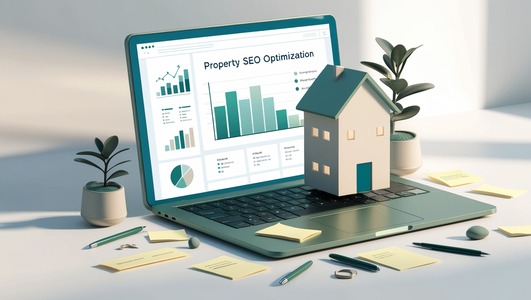The Ultimate Real Estate SEO Checklist for 2025 Success
In the competitive world of digital marketing, highlighting your real estate business online is more important than ever. Real Estate SEO (or real estate SEO) has become one of the most effective tools for attracting potential clients, increasing online visibility, and closing more sales. In this article, you’ll discover what Real Estate SEO is, why it’s crucial for your real estate agency, and how you can implement it step by step.
What is Real Estate SEO?
Real Estate SEO, or SEO for real estate agencies, is a set of search engine optimization strategies specifically geared toward the real estate sector. Its goal is to better position your website on Google (and other search engines) to attract quality organic traffic, i.e., visitors interested in buying, selling, or renting properties.
Unlike traditional SEO, real estate SEO focuses on:
Keywords specific to the real estate market.
Local strategies (local SEO).
Property listing optimization.
Improving the user experience (UX).
Content focused on customer intent.

Why is SEO important in the real estate sector?
Most homebuyers begin their search online. According to recent studies, more than 90% of people searching for a property begin their search on Google. This means that if your website doesn’t appear in the top search results, you’re missing out on a huge number of business opportunities.
Benefits of SEO for real estate agencies:
• Greater visibility on Google.
• Qualified traffic without paying for ads.
• Authority and trust in the market.
• Long-term, sustainable results.
• Better conversion of leads into clients.
Keywords for Real Estate SEO
One of the fundamental pillars of real estate SEO is keyword research. You must identify relevant terms that your target audience is searching for.
Keywords, for example:
• Houses for sale in [city name].
• Apartments for rent.
• Real estate agency in [city name].
• Buy a house without intermediaries.
• Real estate agent in [city name].
• Digital real estate marketing.
• SEO for real estate agents.
• Real estate website optimization.
Step-by-Step Real Estate SEO Strategies
Below, we’ll show you a detailed plan to improve your real estate website’s SEO.
1. On-Page Optimization
This is the foundation of any SEO strategy. Make sure every page of your website is properly optimized.
a. Titles and Meta Descriptions
Use your main keyword at the beginning of the title. For example:
“Real Estate SEO: Improve Your Real Estate Rankings in 2025”
The meta description should be compelling and include a call to action.
b. Clean URLs
Avoid long URLs with unnecessary characters.
c. Hierarchical Headings (H1, H2, H3)
Organize your content with headings that include secondary keywords. For example:
H1: Real Estate SEO
H2: Strategies to position your real estate agency
H3: Local SEO for real estate agents
d. Original and valuable content
Publish unique property descriptions, buying guides, advice articles, and market news.
e. Image Optimization
Use descriptive file names and ALT tags that include keywords.

2. Local Real Estate SEO
Local SEO is crucial for real estate agents and agencies operating in specific geographic areas.
a. Google Business Profile
Register your business on Google. Be sure to include:
• Exact address.
• Opening hours.
• Phone number.
• Website link.
• Real images.
• Reviews from satisfied clients.
b. Local keywords
Example: “real estate in downtown Seville”, “apartments for sale in Granada”
3. Link Building (Off-Page SEO)
Get quality links to your site to increase your domain authority.
Link building strategies for real estate agencies:
Guest posts on industry blogs.
• Participation in real estate forums.
• Links from local news media.
• Collaborations with architects, notaries, or real estate attorneys.
4. Real Estate Blog
An updated blog is an excellent tool for ranking for long-tail keywords and providing value to your visitors.
Content ideas:
• Guides for first-time buyers.
• Best areas to live in [city].
• Real estate market trends.
• How to get a mortgage.
• Comparison between buying and renting.
Publishing at least two articles per month can make a big difference in your SEO ranking.
5. User Experience (UX) and Website Speed
Google rewards fast and user-friendly sites.
Technical Tips:
• Use a responsive design (adapted to mobile devices).
• Optimize loading times.
• Simplify navigation.
• Include visible calls to action (“Contact us,” “Request more info,” etc.).
6. Technical SEO
• Use a properly configured robots.txt file.
• Create a sitemap.xml and submit it to Google Search Console.
• Fix broken links.
• Secure your site with HTTPS.
7. Analysis and Monitoring
Use tools like Google Analytics and Search Console to measure:
• Keywords that bring you traffic.
• Bounce rate.
• Time on page.
• Inbound links.
• Devices used by your visitors.
• Common Real Estate SEO Mistakes

Avoid these errors that can seriously affect your rankings:
• Publishing duplicate listings.
• Not optimizing for mobile devices.
• Ignoring customer reviews.
• Using large, unoptimized images.
• Not updating old content.
• Not including structured data for properties.
Useful Tools for Real Estate SEO
• Yoast SEO (for WordPress)
• Screaming Frog
• Ahrefs or SEMrush
• Google Keyword Planner
•Google PageSpeed Insights
• Canva (for creating attractive images)
• Zapier + Mailchimp (for automating email marketing)
Real Estate SEO Success Stories
Many agencies have tripled their organic traffic by implementing well-structured SEO strategies. For example, one agency in Madrid managed to increase its leads by 120% by optimizing its property listings and creating a blog with local content.
The Future of Real Estate SEO
Real estate SEO is constantly evolving. In the coming years, we will see:
▫ Increased focus on voice SEO (“Homes for rent near me”).
▫ Visual search with tools like Google Lens.
▫ Integration with AI for personalized recommendations.
▫ Relevance of video content (YouTube + SEO).
▫ More competition for top spots on Google Maps.
Conclusion
Real estate SEO is an essential tool for any real estate agent or company that wants to stand out online. Not only does it improve visibility, but it also attracts qualified traffic, builds trust, and helps close more deals.
Applying these strategies takes time and effort, but the results are worth it. Now is the best time to start if you aren’t yet investing in SEO for your real estate business.
Credit by Manan Gupta
Why is Real Estate SEO important for my business?
In today’s digital age, most people start their property search online. Strong Real Estate SEO ensures your listings and services are visible to potential buyers and sellers when they are actively searching, giving you a competitive edge.
Is Real Estate SEO different from general SEO?
While the core principles are the same, Real Estate SEO has specific nuances, such as optimizing for local searches (e.g., “homes for sale in [city]”), integrating property listings (IDX feeds), and catering to a geographically specific audience.
What is a Google My Business profile, and why is it important for Real Estate SEO?
A Google My Business (GMB) profile is a free tool that allows you to manage your online presence across Google, including Search and Maps. It’s vital for local Real Estate SEO as it helps you show up in local search results and provides essential business information to potential clients.
Is mobile-friendliness important for Real Estate SEO?
Yes, it’s crucial! Google uses mobile-first indexing, meaning your website’s mobile version is the primary one used for ranking. A mobile-friendly site provides a better user experience and improves your SEO.
What is IDX, and how does it relate to Real Estate SEO?
IDX (Internet Data Exchange) allows real estate professionals to display MLS (Multiple Listing Service) property listings on their websites. Proper IDX integration is vital for Real Estate SEO as it provides valuable content and keeps users on your site.
Should I hire an SEO agency for my real estate business?
If you lack the time or expertise, hiring a specialized Real Estate SEO agency can be a wise investment. They can develop and execute a comprehensive strategy, saving you time and potentially accelerating your results.
What’s the most important tip for Real Estate SEO?
Focus on providing value to your audience. Create high-quality, relevant content, ensure a seamless user experience, and consistently optimize your online presence. When you serve your audience well, search engines will reward you.




